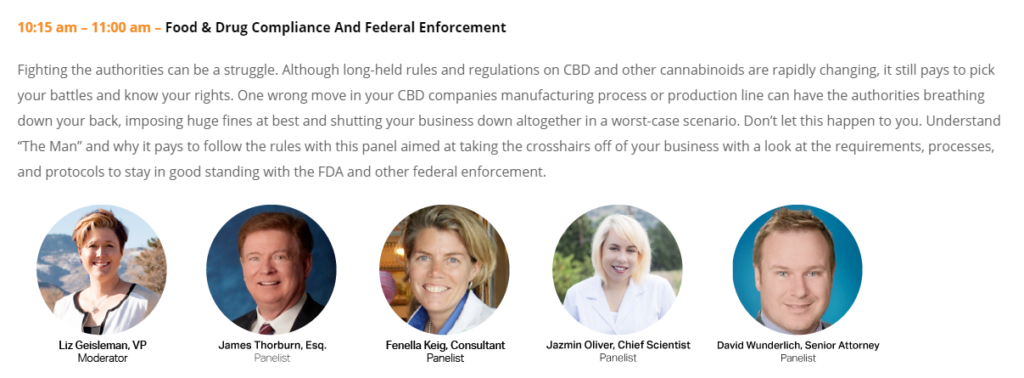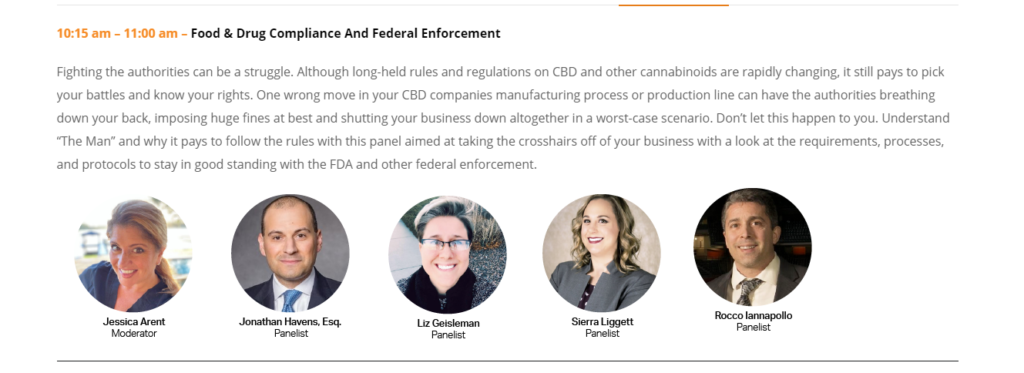
This is a reoccurring topic of discussion at The CBD Expo, therefore this is a fluid post that we are continually updating. We have participated in multiple shows on the same panel discussion and want to ensure we provide the newest and diverse points that are made.
This panel in Denver May 7-8th had moderator Liz Geisleman from 710Spirits® along with James Thorburn, Esq. from Thorburn Law Group, Fenella Keig a CBD compliance and GMP consultant, Jazmin Oliver with Cannabis Science Consultants and David Wunderlich with Hoban Law Group.

This panel hosted two Canna Consortium members April 8-9th in Indianapolis. Along with moderator Jessica Arent. Panelists Sierra Liggett Specialty Packaging Manager from BudPack, Jonathan Havens Partner at Saul Ewing Arnstein & Lehr LLP and of course Liz Geisleman with 710Spirits® and Rocco Iannapollo with Cannabis Kitchen Supplies.

What is Food and Drug Compliance?
The Food and Drug Administration (FDA) “…is responsible for protecting the public health by ensuring the safety, efficacy, and security of human and veterinary drugs, biological products, and medical devices; and by ensuring the safety of our nation’s food supply, cosmetics, and products that emit radiation.” FDA.
So what does this look like for those in the CBD industry?
As this market is quickly growing your company must be dedicated to be up to date on the rules and regulations for the continuation of your business. Starting with small simple Standard Operating Procedures (SOPs) such as hand washing stations, proper training for employees and PPE provided, can put you a cut above your competition. Along with having a dedicated individual or team keeping up with GMP certifications can help ensure you are always being compliant. Always have a set plan incase you are audited by the FDA and an emergency fund. You then are setting your business up for a future brand of trustworthy products and a strong reputation parallel to your compliance.
Being aware of the Federal Trade Commission (FTC) is important to maintain compliancy as well. The FTC focuses on false advertising and fairness of commerce as it relates to competitive businesses and consumers. The FTC has joined with the FDA to combine enforcement in the CBD arena. Focusing on cannabinoid claims they jointly determine companies with false claims and enforcing truth in advertising on a national level. Unlike the FDA, FTC will go straight to administering a fine. Having two different organizations combing through your content means staying vigilant on what your marketing real estate is claiming. It is essential to stay compliant and avoid any and all penalties.
Implications of Non-Compliancy For Your Product
Making any claims that are medical, Covid-19, or extravagant can put you on the FDA and FTC’s radar. Claims are the number one thing the FDA is looking for throughout your entire marketing real estate. If you do get hit with a non-compliant claim the FDA sends out a warning letter. Which then sets in motion a chain reaction that can detrimental effects on your business. The warning letter is published on the FDA’s website and sends out a national notice to anyone paying attention that their is a compliance issue associated with your company. Also sending out a flair gun to any attorneys. Many who are looking to see if their is a potential claim they can use in a lawsuit or civil suit. Which can be incredibly costly to either defend or settle.
Set yourself up for success
Having an attorney on your side who is well versed on working with the FDA and claims is always a good idea if you have been issued a warning letter. Having them there to guide and advocate for you throughout the entire process. You then have 15 days to respond to the warning letter. By either retracting claims or dealing with any of the issues outlined in the letter.
If the FDA decides to come to your facility to audit you here are some things to be aware of. You can already bet they’ve seen your website, social media accounts and marketing content so always try to be inspection ready. Have a plan in place and, let everyone in the facility aware you are being audited. A designated point of contact is the best approach. Make sure to only answer questions asked don’t offer up more information than necessary. Also be aware that the audit doesn’t begin once they walk in the door. They might walk your whole property first before they even enter the building. So always be compliant to the edge of the property line not just the front door.
Starting a New Company/Brand
If you are a new company or starting a CBD brand here are some things to keep in mind to assure you are staying compliant.
Best Practices At The Foundation
Having the best compliance practices will create the longevity of your company moving forward. Have a plan in place! The need for compliance awareness will grow as your business grows. Don’t always be trying to play catch-up and have it in your budget moving forward as a safety net. Be aware of which industry regulation you are going to follow. The FDA has a list of different industries they watch and regulate. Such as food, dietary supplements, drugs, cosmetics, veterinary products, synthesized molecules etc.
CBD has been operating in cosmetics for awhile now. But if you are entering the market with edibles or anything that can be eaten, your best bet is to be aware of both food and dietary supplements regulations. Because of regulatory reasons FDA is more likely to approve a dietary supplement at this point. The FDA has a more tolerant attitude toward supplements with up to a 15% variance in what they will accept when testing products.
Always have periodic reviews to ensure you are staying compliant and keeping up with the latest rules. It is imperative you have an attorney or consultant that is well versed in the governance of these topics. Every aspect of your company should align to your brand of compliancy and quality.
Package and Labeling Product
The panels also discussed the importance of your company’s packaging and labeling. While staying up to date on the latest regulations and rules. Sierra Liggett hit home making sure to have package and labeling that is FDA compliant both in the US and international markets.
The top issues with most non-compliant products is not tracking where your product components are coming from. If the source of your product is not FDA compliant or National Sanitation Foundation (NSF) certified it can put your product in trouble of testing “hot”. Even down to the equipment make sure it is properly cleaned and maintained. All could impact your end product. And is still 100% your responsibility even when white labeling! Don’t just trust that every part of your supply chain is compliant. Do your due diligence and make sure every person or machine touching your final product is safe and compliant. A contract manufacture can be GMP certified but your company has to be as well!
Also be aware of e-commerce. Know where you can and can’t ship products to. E-commerce is each individual state’s commerce regulation. If you are concerned always check with a subject matter expert to have peace of mind and quality products. Review your first set of labels with local regulations. Send to an attorney and have multiple different sets of labels, checking your states website for reference. Using a combination of attorney and consultant in the beginning will save you money in the long run. Especially a regulatory consultant for things such as fire regulations are essential.
Allay Cannabis Consulting is an excellent consulting firm we recommend for all your consulting needs.
Where To Look Moving Forward
Colorado and California
Colorado was one of the first states to legalize recreational marijuana. Therefore should be used as a framework for others going forward. The state created a 200+ page document that defined industrial hemp, manufacturing licensing and as many definitions as possible to aid in the regulation. They also created CHAMP (Colorado Hemp Advancement & Management Plan). Which developed the blueprint for the full supply chain to identify industry guidelines, research needs, department resources and much more.
California is also constantly updating and changing their laws regarding marijuana and hemp. Therefore they are always a good frame of reference to keep up to date when entering this market. Always make sure to get your trademark established. And when going international make sure you are being aware e-commerce and laws in each state you are shipping to.
International
We’re now watching as Canada and Mexico have legalized marijuana across their prospective country’s to see what they do next. ASTM International is currently writing the SOPs for use of pesticides on cannabis. They are about six to eight months away from setting the standard charged out of the EU. This will be an excellent framework Canada and Mexico expect to use moving forward in what rules and laws to enforce. In view of this, it is estimated that the FDA will simply follow whatever is set by ASTM with federal legalization on the horizon.
To learn more about ASTM and other regulatory bodies you should be aware of check out our article here.
Alchemy Broncos
Still, this industry is moving at lightning speeds. For example, Delta-8 has become the hottest and newest minor cannabinoid from hemp. Yet not enough knowledge and research has been done to even know what to standardize equipment against testing for D8. Therefore, it could be almost impossible for a product not to come back with results of some illegal or currently unregulated substance. And remember D8 is still subject to all FDA requirements! Just because it’s a new product on the market does not mean it circumvents all regulations. The entrance of Delta-8 is a perfect example of still making sure to adhere to FDA and FTC compliant practices for the tenacity of your company.
The terminology in legislation simply cannot keep up with the chemistry. If the regulation and laws attempt to set the standards then the research needs to back up the claims. While ensuring the safety of the consumer in the private sector should be the main priority of all involved in the cannabis industry as we continue to learn and experiment. The FTC website updates a list of what other companies will be fined for and what your specific state is allowing!
Since this industry is so new, regulators are extremely attentive of what CBD companies are doing. In another industry some it might slide. But we have to create a industry that has the reputation of being compliant and safe before expanding out into different marketing and advertising claims.
Thank you to all the panelists for their excellent insight and helpful advice. If you have any questions feel free to reach out to TheCannaConsortium for more information.
Works Cited
“CHAMP Initiative.” Department of Agriculture, ag.colorado.gov/plants/industrial-hemp/champ-initiative.
Federal Trade Commission, 14 Apr. 2021, www.ftc.gov/.

Teagan is the Marketing & Communications Manager for 710Spirits® and Rocky Mountain Reagents. While continually learning about the cannabis industry and all the possibilities it has to offer she creates content for The Canna Consortium both for blog posts and social media. Make sure to check out @thecannaconsortium2.0 for all industry updates and news.
